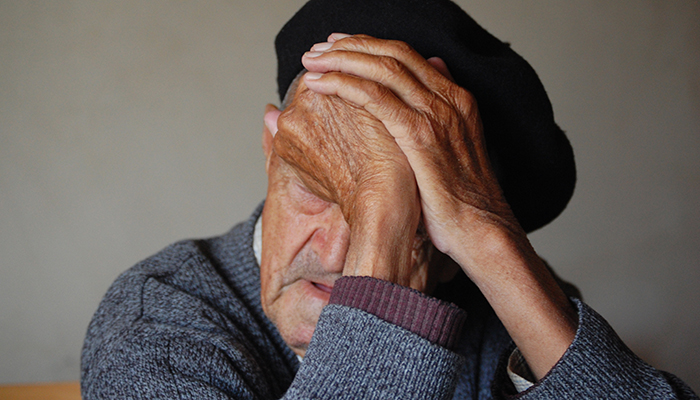Aging Well in the Upstate
Helpful tips for family caregivers
September/October 2020
In this issue we complete our series on wise decision making with an article about the skill of mindfulness. Combined with cooling down physically, this strategy can help you cool down emotionally. By silencing your mental chatter, you are better able to a see a situation with less turmoil and make decisions you won’t regret later. In our second article we acknowledge September as Pain Awareness Month and offer tips for identifying pain in a person who has dementia. September is also National Prostate Health Month, so we include an article to help you assist your loved one in making decisions about BPH surgery.
Share Page:
What is "mindfulness," anyway?
 Many people confuse mindfulness with meditation and Eastern religions. Mindfulness is a skill gained by training your mind to observe life situations in a less emotionally charged way. It is a mental skill that gives you a less-cluttered perspective. It lowers daily stress and is particularly helpful when making important decisions under duress.
Many people confuse mindfulness with meditation and Eastern religions. Mindfulness is a skill gained by training your mind to observe life situations in a less emotionally charged way. It is a mental skill that gives you a less-cluttered perspective. It lowers daily stress and is particularly helpful when making important decisions under duress.
Mindfulness is an intentional choice to focus on the present. It takes practice to hold your attention fully to your immediate experience. If you were taking a shower, for instance, you might comfortably go through the motions. But your mind would be elsewhere, rehashing a fraught conversation. Or planning a weekend activity. Try taking a shower while mindfully remaining in the present. Train your mind to notice the sensation of the water, the scent of the soap. Pay attention to each part of your body as you wash it, observing as if never seen before. If your thoughts wander, gently refocus your attention back to the here and now. Notice how calm you feel.
Mindfulness also involves acceptance and kindness. Being mindfully present in a social situation, you learn to view interchanges without judgment. Observe each experience as if it were occurring for the first time. What happens is neither good nor bad. It’s just people doing the best they can. This practice leads to acceptance of others. And acceptance of yourself as you are. You don’t spend time mulling over past grievances or anticipating ill intent. Such thoughts only foster depression and anxiety. Instead, a mindful approach helps you accept “what is” about a situation. Then, if you want to change things, you can make emotionally calm choices about what to do next.
Medical studies looking at complementary therapies show that people who develop mindfulness skills experience improved physical health. They also have reduced anxiety and depression. Plus, mindfulness increases learning, memory, attention, and empathy. Books, podcasts, classes, or videos are effective ways to train your mind and increase your mindfulness skills.
Return to topNonverbal signs of pain
 Dementia itself does not cause physical pain. But people with dementia still encounter pain, just like anyone else: headaches, arthritis, tummy aches. They just can’t describe it. They might even deny having pain when you ask because they don’t understand the question.
Dementia itself does not cause physical pain. But people with dementia still encounter pain, just like anyone else: headaches, arthritis, tummy aches. They just can’t describe it. They might even deny having pain when you ask because they don’t understand the question.
Learn the nonverbal signs of pain so your loved one doesn’t suffer. (Your knowledge of their pains before their memory loss condition will be helpful in identifying pain now.) Nonverbal signs of pain include
- short, rapid breathing
- unexplained sweating
- grimacing, wincing, or frowning
- moaning, whimpering, crying, or shouting
- shielding a part of their body, curling up
- rocking or self-soothing movements
- tense or rigid body
Other signs include withdrawn behavior, increased confusion, trouble sleeping, inability to be comforted, restlessness or lashing out, refusal to eat. The more frequent these signs appear and the more intense they seem, the more likely there is a high degree of pain.
If you don’t see an obvious source of pain—a mouth sore, a reddened or sensitive area, a bleeding cut, or a fever—contact the doctor. Describe what you have been observing.
- Can you think of a likely cause?
- Are there patterns, such as time of day?
- Is there swelling somewhere? A particular location of the pain?
- Is your loved one constipated?
- Is he or she urinating frequently?
- What have you found that seems to help?
You and the doctor together can determine if there is a problem to be treated—and if not, what you can do to effectively manage your relative’s pain.
In the later stages of dementia, your loved one may not understand what’s happening, but he or she understands comfort. If a medical solution isn’t possible, do what you can to provide comforting doses of pleasure and kindness. Perhaps try a foot rub or a favorite song.
Return to topBPH: Weighing surgical options
 Ever wondered why older men seem to need to urinate frequently? An enlarged prostate gland is likely to blame. The condition, benign prostatic hyperplasia, or BPH, is so common that it affects 90% of men by age 80.
Ever wondered why older men seem to need to urinate frequently? An enlarged prostate gland is likely to blame. The condition, benign prostatic hyperplasia, or BPH, is so common that it affects 90% of men by age 80.
The prostate gland is roughly donut shaped and is located below the bladder. The urethra, the “tube” that carries urine out from the bladder, passes through the prostate. As the prostate enlarges (swells), it squeezes the urethra, making it difficult for urine to flow through.
Symptoms of BPH include
- increased frequency and urgency of urination
- weak urine flow
- leakage, or inability to control urination
While BPH is not dangerous, it can have a powerful impact on quality of life. Affected men feel they cannot stray far from a bathroom. And they worry about the embarrassment of an accident. BPH also causes frequent nighttime urination, which can bring on insomnia, fatigue, and depression.
Surgery
Although medication and lifestyle changes can be effective, if symptoms become too imposing, the doctor will probably suggest surgery. There are many different types. Review these questions with the doctor as you help your loved one evaluate the options:
- What kind of improvement can be expected? How soon after the procedure will symptoms be relieved?
- How long will the benefits last? What is the likelihood of needing retreatment in five years?
- What is the recuperation like? Pain? Bleeding? Swelling?
- What are the risks or complications? How likely are they to happen?
- Can this procedure occur on an outpatient basis, or will hospitalization be required?
There is no one surgery that fits all. And new approaches are being developed all the time. The goal is to find the surgery that brings the greatest relief for the longest period of time with the lowest likelihood of complications.
Return to top
